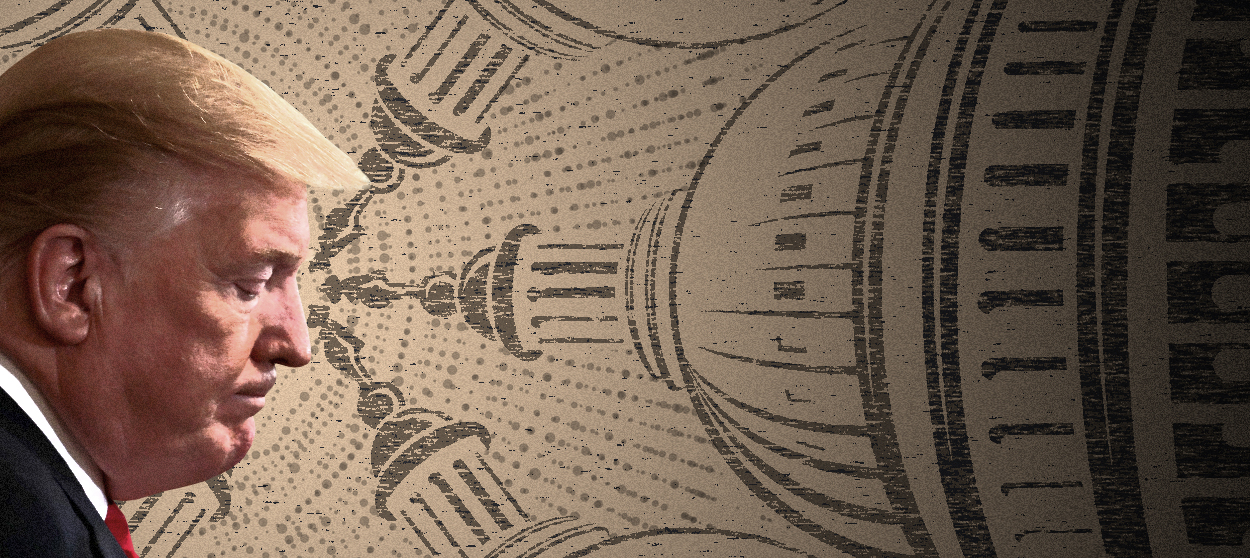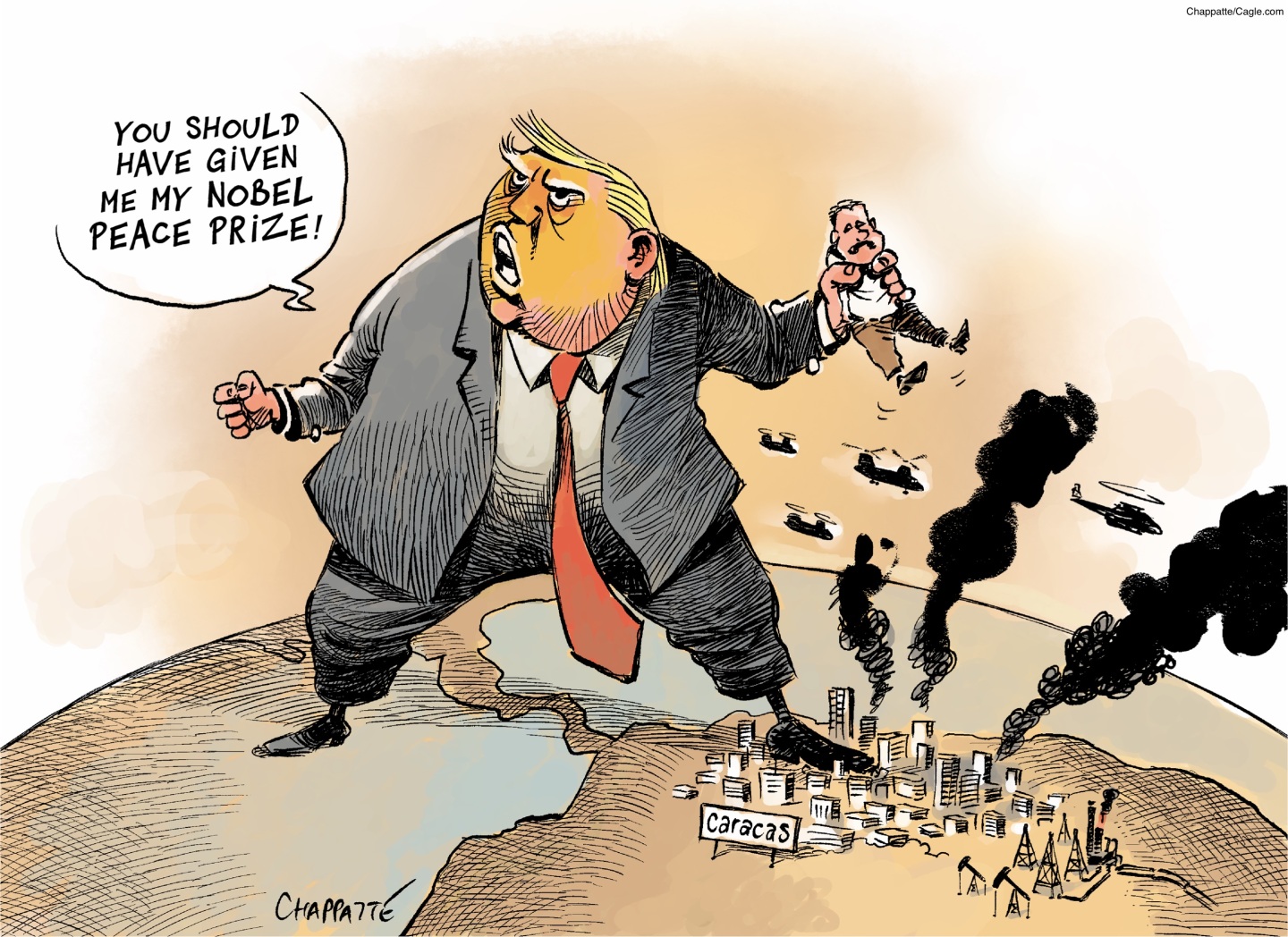Why Congress should censure Trump
The president must be held accountable. Censure might be the best option next to impeachment.


One of the big problems with our leaders in Washington, D.C., is that almost all of them want power, but few actually want responsibility.
The truth of that proposition can be weighed in the level of inaction that has greeted the release of Special Counsel Robert Mueller's report. If you rightly ignore President Trump's oft-repeated "No collusion! No obstruction!" spin, it is clear from the findings that something should be done about his behavior.
But what? And by whom? As the idea of impeachment fades from the limelight, censure is emerging as an alternative. This approach would put a stamp of congressional disapproval on Trump's historical record — an official black mark that could never be erased.
The Week
Escape your echo chamber. Get the facts behind the news, plus analysis from multiple perspectives.

Sign up for The Week's Free Newsletters
From our morning news briefing to a weekly Good News Newsletter, get the best of The Week delivered directly to your inbox.
From our morning news briefing to a weekly Good News Newsletter, get the best of The Week delivered directly to your inbox.
It is now clear that Democratic leaders do not have much taste for impeachment. The easiest way for them to get there would be if Mueller had delivered them a report that directly told them to act. They did not get that. Mueller offered Congress a roadmap with which to act on his findings, but apparently felt he could not legally accuse the president of a crime. The standard for impeachment, of course, is a finding of "high crimes and misdemeanors" — and Mueller's apparent inability to deliver an explicit verdict on that front gave Democratic leaders cover for inaction.
They wanted Mueller to empower them to move against the president. Instead, he gave them the responsibility to choose. And they seem mostly reluctant to use it.
Mueller's report all but cries out for somebody to hold the president accountable — demonstrating amply, as Lawfare points out, that Trump established "a pattern of behavior … in his interactions with law enforcement that is simply incompatible with the president's duty to 'take care that the laws are faithfully executed.'"
At various points throughout the investigation, the president lied about his actions during and after the campaign. He ordered aides to short-circuit the investigation — even to the point of firing Mueller — then ordered them to lie about that. If Trump somehow failed to cross the line into obstructing justice through those actions, it is because so many of his aides — trying, apparently, not to take the fall for their boss — simply refused to follow his orders.
A free daily email with the biggest news stories of the day – and the best features from TheWeek.com
Clearly, Trump intended to obstruct the inquiry. He failed. But his inability to see his crimes through to completion should not shield him from punishment.
So why are Democratic leaders so reluctant to act? Because they are worried about a backlash. The GOP impeachment of Bill Clinton — and the toll it ended up taking on Republicans in Congress in 1998 — is a fresh memory for the party's old hands. The fact that the Senate remains in Republican control means there is not much political upside to impeachment: Democrats can charge the fort, but it is highly unlikely they will take it.
We still have some time to see if Democrats can and will choose to build an impeachment case against the president. But if they can't or won't, they should not just ignore Trump's behavior. This is where censure comes in.
Censure is a formal expression of disapproval by Congress — a way for Democrats to put a blot on Trump's official historic record without putting the nation through an official impeachment process, or exposing Democratic leaders to the political risks impeachment might entail. That puts the question of the president and his behavior back in voters' hands for the 2020 election.
Censure was proposed in 1998 as a middle ground for Republicans angered by Bill Clinton's behavior but who didn't think it rose to the level of high crime or misdemeanor. But that possibility was lost to history as the impeachment movement gained momentum.
The problem with a censure, of course, is that it carries no real consequences: It amounts to a scolding from Congress, and Trump's behavior — not just the obstruction, but his welcoming of election interference from the Russians — would seem to merit more than a slap on the wrist.
The upside is that it's more likely than impeachment to succeed: Either house of Congress can bring a resolution of censure on its own. Such a resolution would easily pass the Democratic-controlled House, of course, but it's also possible it might find backing in the Republican-controlled Senate: Sen. Mitt Romney (R-Utah), has signaled his dissatisfaction with the president — he might be persuaded to join such an effort, as might Sen. Susan Collins (R-Maine).
This might feel insufficient, but it is still necessary: Trump's lawyer, Rudy Giuliani, spent Sunday morning on television mocking the consciences of Americans who think it's wrong to accept help from a rival country during an election. "Stop the pious act!" he warned CNN's Jake Tapper, in apparent certainty that piety in politics is merely a pose. Such cynicism is poisonous, and deserves a rebuke.
The difference between power and responsibility is a willingness to accept that there might be consequences for doing one's duty. The duty of Congress — all of Congress, not just Democrats — is clear: to hold the president to some level of accountability for his actions. It might or might not be popular; Democratic leaders might find their election fears justified. But it is the right thing to do.
Joel Mathis is a writer with 30 years of newspaper and online journalism experience. His work also regularly appears in National Geographic and The Kansas City Star. His awards include best online commentary at the Online News Association and (twice) at the City and Regional Magazine Association.
-
 5 hilariously slippery cartoons about Trump’s grab for Venezuelan oil
5 hilariously slippery cartoons about Trump’s grab for Venezuelan oilCartoons Artists take on a big threat, the FIFA Peace Prize, and more
-
 A running list of everything Trump has named or renamed after himself
A running list of everything Trump has named or renamed after himselfIn Depth The Kennedy Center is the latest thing to be slapped with Trump’s name
-
 Do oil companies really want to invest in Venezuela?
Do oil companies really want to invest in Venezuela?Today’s Big Question Trump claims control over crude reserves, but challenges loom
-
 The billionaires’ wealth tax: a catastrophe for California?
The billionaires’ wealth tax: a catastrophe for California?Talking Point Peter Thiel and Larry Page preparing to change state residency
-
 Bari Weiss’ ‘60 Minutes’ scandal is about more than one report
Bari Weiss’ ‘60 Minutes’ scandal is about more than one reportIN THE SPOTLIGHT By blocking an approved segment on a controversial prison holding US deportees in El Salvador, the editor-in-chief of CBS News has become the main story
-
 Has Zohran Mamdani shown the Democrats how to win again?
Has Zohran Mamdani shown the Democrats how to win again?Today’s Big Question New York City mayoral election touted as victory for left-wing populists but moderate centrist wins elsewhere present more complex path for Democratic Party
-
 Millions turn out for anti-Trump ‘No Kings’ rallies
Millions turn out for anti-Trump ‘No Kings’ ralliesSpeed Read An estimated 7 million people participated, 2 million more than at the first ‘No Kings’ protest in June
-
 Ghislaine Maxwell: angling for a Trump pardon
Ghislaine Maxwell: angling for a Trump pardonTalking Point Convicted sex trafficker's testimony could shed new light on president's links to Jeffrey Epstein
-
 The last words and final moments of 40 presidents
The last words and final moments of 40 presidentsThe Explainer Some are eloquent quotes worthy of the holders of the highest office in the nation, and others... aren't
-
 The JFK files: the truth at last?
The JFK files: the truth at last?In The Spotlight More than 64,000 previously classified documents relating the 1963 assassination of John F. Kennedy have been released by the Trump administration
-
 'Seriously, not literally': how should the world take Donald Trump?
'Seriously, not literally': how should the world take Donald Trump?Today's big question White House rhetoric and reality look likely to become increasingly blurred
